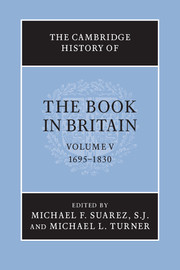Book contents
- Frontmatter
- Introduction
- PART I THE QUANTITY AND NATURE OF PRINTED MATTER
- PART II ECONOMIC, LEGAL AND CULTURAL CONTEXTS
- 3 The book as a commodity
- 4 Copyright, authors and censorship
- 5 The rise of the professional author?
- 6 Women and print: readers, writers and the market
- PART III THE TECHNOLOGIES AND AESTHETICS OF BOOK PRODUCTION
- PART IV THE BOOK TRADE AND ITS MARKETS
- V BOOKS AND THEIR READERS
- Abbreviations used in bibliography
- Bibliography
- Index
- Frontispiece
- Plate section
- References
6 - Women and print: readers, writers and the market
from PART II - ECONOMIC, LEGAL AND CULTURAL CONTEXTS
Published online by Cambridge University Press: 28 September 2010
- Frontmatter
- Introduction
- PART I THE QUANTITY AND NATURE OF PRINTED MATTER
- PART II ECONOMIC, LEGAL AND CULTURAL CONTEXTS
- 3 The book as a commodity
- 4 Copyright, authors and censorship
- 5 The rise of the professional author?
- 6 Women and print: readers, writers and the market
- PART III THE TECHNOLOGIES AND AESTHETICS OF BOOK PRODUCTION
- PART IV THE BOOK TRADE AND ITS MARKETS
- V BOOKS AND THEIR READERS
- Abbreviations used in bibliography
- Bibliography
- Index
- Frontispiece
- Plate section
- References
Summary
What difference did women make to the book trade during the long eighteenth century? Female authorship and female readership burgeoned during this period, and some women were also active in the trade itself. If this had not been the case, if women had been illiterate and if writers, publishing workers and readers had all been male, would the production and consumption of books, what Robert Darnton calls ‘the social and cultural history of communication by print’, have developed differently?
Such hypothetical questions are clearly unanswerable, up there in the lunar sphere along with questions about the survival of Queen Anne’s son and Wolfe’s defeat on the Plains of Abraham. Nevertheless, just asking them may help to clarify the issue of what is being investigated in a study of women and eighteenth-century print culture. Any account of women’s contributions to the eighteenth-century book trade and the practices of reading and writing, or of the difference between their experience and that of men, keeps one eye on the unanswerable questions.
- Type
- Chapter
- Information
- The Cambridge History of the Book in Britain , pp. 146 - 160Publisher: Cambridge University PressPrint publication year: 2009
References
- 8
- Cited by



